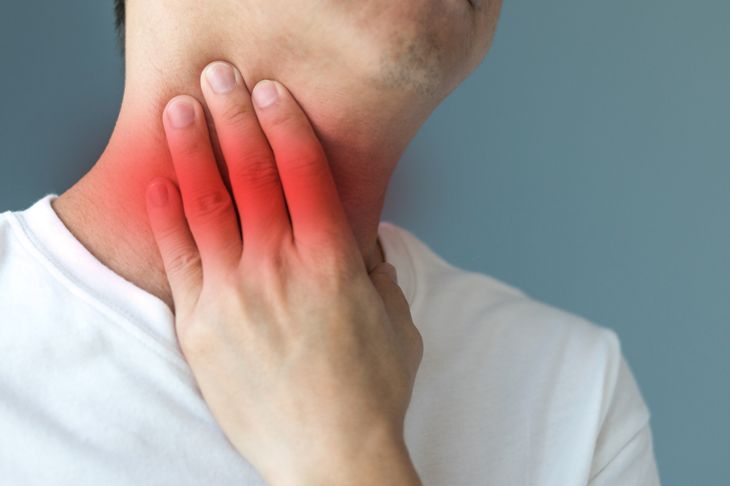The American Osteopathic Association (AOA) suggests that a sore throat is one of the most typical reasons for doctor visits. Medically, a sore throat is called pharyngitis. It is characterized by inflammation of the back of the throat, or pharynx. A sore throat is a common reason for staying home from school or work. Keep reading to learn more about causes, symptoms, and treatments for a sore throat. Depending on the underlying cause of pharyngitis, you will experience a variety of symptoms, which require different types of treatment.
Cause: Virus
A virus commonly causes a sore throat. Some examples of viral infections include influenza and mononucleosis. The adenovirus is one of the causes of the common cold. Depending on the cause of your pharyngitis, you will have different symptoms and treatment options.
Cause: Bacteria
A bacterial infection can also result in a sore throat. This condition may be slightly more serious than a viral infection, but both can last several days. The group streptococcus is the most common bacterial infection; it is also referred to as strep throat. In rare cases, pharyngitis is caused by a bacteria related to Corynebacterium or sexually transmitted diseases like Chlamydia or gonorrhea.
Other Causes
Other specific illnesses that can cause a sore throat include the measles, chickenpox, croup, or whooping cough. You have a higher risk of developing pharyngitis if you are exposed to frequent colds or flu. This may be the case if you work in healthcare or daycare. Allergies or sinus infections are also associated with pharyngitis.
Symptoms of Adenovirus
Even though the incubation period is normally two to five days, symptoms of the common cold can linger for about ten days. Although symptoms may vary from person to person, the adenovirus causes a sore, dry, or scratchy throat. Other symptoms associated with pharyngitis and the common cold may include sneezing or a runny nose along with a cough. You may develop a headache or feel fatigue. Body aches, chills, and a low-grade fever are also common. Consult with your medical provider if you have a sore throat for longer than a week or your fever reaches above 100.4°F.
Symptoms of Mononucleosis
Another common viral infection that causes pharyngitis is the Epstein-Barr virus. It leads to a condition known as mononucleosis or mono. Although you will have a sore throat with this infection, you will exhibit different symptoms than that of the common cold. With mono, you may feel run down or worn out, which is medically known as malaise. You can lose your appetite and experience severe fatigue. A fever and muscle aches will most likely accompany your sore throat. Mono also causes swollen lymph nodes and a rash, which should alert you to seek medical attention.
Symptoms of Strep Throat
If you have strep throat, your symptoms will differ from the common cold or mono. Although you might have general malaise, loss of appetite, a fever, and chills, you will also develop an unusual taste in the mouth. Gray or white patches will form on your swollen, red throat. You might find it difficult to swallow if you have strep throat. Your doctor will need to perform a throat culture to determine if you test positive for streptococcus. Keep in mind you will be contagious until you receive treatment.
Treatment: At-Home Care
The common cold and other viral infections often require at-home care to ease the symptoms as the virus runs its course. You can drink lots of fluids to avoid dehydration. Gargling warm salt water might soothe your sore throat. Eating warm broth, using a humidifier, and getting plenty of rest can also help with pharyngitis.
Treatment: Pain Medication or Herbal Remedies
If you have a fever or body and muscle aches, over-the-counter medication can help soothe the symptoms. Painkillers can lower your fever and relieve pain. Throat lozenges are also medicated drops that can instantly, but temporarily, ease a scratchy, dry throat. Besides pharmaceuticals, alternative remedies can also help with pharyngitis. Herbs such as honeysuckle, sage, and slippery elm have been known to treat a sore throat. However, discuss these options with your doctor to avoid drug interactions or other issues.
Treatment: Antibiotics
A bacterial infection that causes pharyngitis requires medical treatment. Viral infections do not respond to antibiotics, so the only treatment is at-home remedies to ease the symptoms. However, in the case of a strep throat, you will need amoxicillin or penicillin to treat the infection. You should always take the full prescription of antibiotics, which usually lasts about ten days, even if you feel better beforehand. That way, the bacterial infection will not return with harsher symptoms.
Prevention
There are several precautions you can take to prevent a sore throat. For example, you should avoid sharing drinks, food, or eating utensils. Try to avoid contact with other people who are sick. You can also wash your hands frequently, especially if you cough, sneeze, or before eating. Always use soap when washing your hands. If that is not possible, try alcohol-based hand sanitizer to kill germs. Smoking or inhaling secondhand smoke can also worsen pharyngitis.

 Home
Home Health
Health Diet & Nutrition
Diet & Nutrition Living Well
Living Well More
More




















